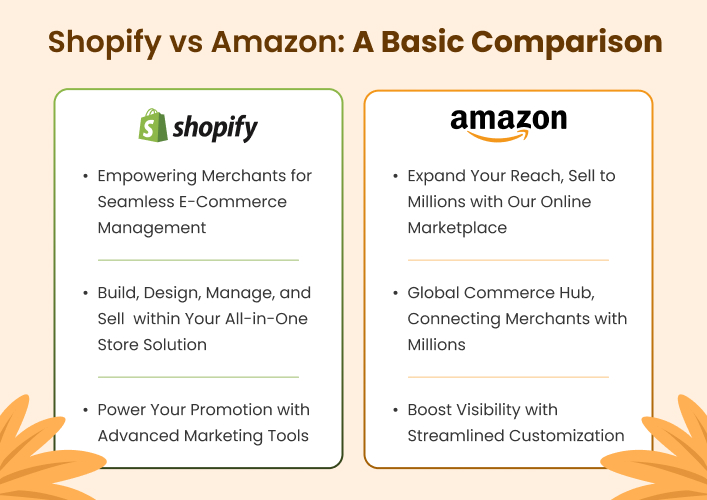Shopify vs Amazon: A basic comparison

- Shopify: Shopify is an ecommerce platform that allows merchants to sell and manage the store. It provides many features to help businesses sell their products effectively. You can create your own store, customize its design, manage products, and handle payments on Shopify. Furthermore, Shopify merchants can promote their products using the advanced marketing features of Shopify like emails, popups, cart recovery, social media, etc.
- Amazon: It is an online marketplace that helps merchants sell their products to millions of people. Thus, sellers can grow their business and increase their customer base. Furthermore, it allows merchants to list their products and it handles their payment and order fulfillment process. Amazon allows sponsor ads to promote the products but limits the customization.
Shopify vs Amazon: Ease of use
Shopify provides a simple onboarding procedure. Beginners may learn it and there are no sophisticated procedures or technical knowledge needed. Furthermore, it gives you the freedom to experiment with customization until you find the best. It has a drag-and-drop builder that allows you to create a simple online store. Additionally, inventory and product management is simple. Shopify provides comprehensive documentation, round-the-clock assistance, and a supportive community to help you out anytime you need it.
Though Amazon is simple to set up, you can find complexity afterward. But, you don’t have to worry about the website design or performance as Amazon handles both effectively.
Shopify vs Amazon: E-commerce features
As for Amazon, its e-commerce services are intended for product listings and sales, as it is essentially a marketplace. Amazon provides a specialized order fulfillment service called Fulfillment by Amazon, or FBA, as well as tools for selling products, conventional shop templates, and more. Similarly, Shopify also offers a Fulfillment service called SFN. Furthermore, by handling payments for merchants on its platform, Amazon facilitates the management of online stores and offers a practical framework for transactions. Additionally, it gives you access to a large and well-established consumer base, which might lead to faster income and sales.
Shopify vs Amazon: Pricing
Shopify provides a complimentary three-day trial for all tiers and a three-month membership for only $1. Thereafter, the basic plan is for $39 after the first 3 months for a small company and individual strategy. You may add up to two staff accounts and view basic reports with it. The Shopify plan comes with $105 with advanced features and 5 staff accounts. Lastly, advanced Shopify costs $399 and provides 15 staff accounts, a custom report builder, and inventory locations up to 1000.
Conversely, Amazon has two main pricing tiers in addition to various fees and referral fees. The cost per item sold under the individual plan is $0.99. The monthly cost of the professional package is $39.99. Furthermore, Order fulfillment via Amazon fulfillment service incurs fees based on the item features and delivery location. Additionally, Amazon charges a percentage, which can range from 8% to 45%, or a minimum fee of $0.30, for each item sold through a referral. Other expenses include closing costs, high-volume listing fees, rental service fees, and return administration fees.
Conclusion
In conclusion, if you prioritize customization and a diverse sales approach, Shopify may be the better choice. On the other hand, if you seek built-in traffic, trust, and a more hands-off fulfillment process, Amazon could be the preferred platform. Some businesses even choose a hybrid model, utilizing both platforms to maximize reach.
FAQs
Can I use both Shopify and Amazon for my business?
Which platform is more cost-effective?
How do I drive traffic to my Shopify store?
Can I use Fulfillment by Amazon with Shopify?
Which platform is better for beginners?
Ravi Bhojani is the Chief Marketing Officer (CMO) at Alian Software, where he spearheads the company’s marketing strategies and drives its brand presence in the competitive IT services landscape. With over a decade of experience in the technology and marketing sectors, Ravi has consistently demonstrated his ability to blend innovative marketing techniques with deep industry knowledge to deliver outstanding results.